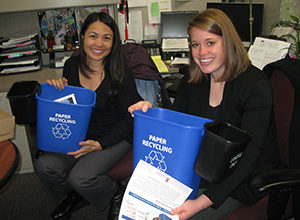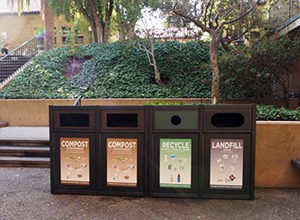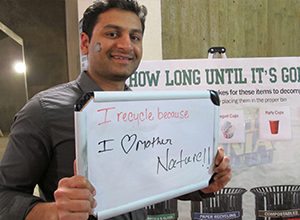Stanford has a long history of minimizing waste and became an early adopter of a formal recycling program when students first worked on the effort as a class project in the late 1970s. Managing the campus’s reusable resources and minimizing waste is a crucial component of creating a more sustainable Stanford. By using less, reusing more, recycling, and composting, the university sends less waste to landfill; preserves natural resources by providing recyclable materials to manufacturers; and contributes to efforts to conserve water and energy, while reducing greenhouse gas emissions and other pollution.
Stanford has increased its landfill diversion rate, also referred to as its recycling rate, from 30% in 1994 to 66% in 2015, with the goal of reaching 75%, the new state target, by 2020.
Stanford’s waste reduction, recycling, composting, and solid waste program serves all academic and athletic areas, Residential & Dining Enterprises (R&DE), Faculty Staff Housing, Stanford University Medical Center, SLAC National Accelerator Laboratory, and all associated construction sites. The university continually improves and expands recycling and composting collection activities, identifies new markets for waste materials and recyclables, and raises awareness so that reducing, reusing, recycling, and composting become an ingrained set of behaviors. Stanford partners with Peninsula Sanitary Service, Inc. (PSSI), its recycling and waste management service provider, to reduce waste, increase landfill diversion, and move closer to zero waste (defined as at least 90% diversion).
Results
Efforts to minimize waste have significantly reduced the total amount of material Stanford sends to landfill: 8,582 tons in 2015, compared to its peak of 14,000 tons in 1998. This year:
- Stanford achieved a recycling rate of 66%, up from 30% in 1994. The recycling rate for construction and demolition waste generated by campus projects (taken to a specialized facility) was 88%.

More than 7,800 deskside recycling bins have been distributed
- The Deskside Paper Recycling and Mini–Trash Can Program expanded into 86 buildings, with 7,840 sets of bins and Zero Waste Guidelines delivered. This program continues to be extended into existing and new academic buildings. The Sloan Math Building increased its paper recycling amount by 43% after implementing this program!
- PSSI/Stanford Recycling trained over 340 people on campus on what is and isn’t recyclable and compostable through the Office of Sustainability’s Waste Reduction Class, café staff trainings, and custodial trainings. In addition, more people were reached through 10 tabling events on campus and eight tours of the Stanford Recycling Center; those participating in the tours included two people from Taiwan and 90 kids from Escondido Elementary School.
- Departments funded 70 additional compost collection points through the Customer-Funded Compostables Collection Program, launched in July 2015. In addition, more than 120 individuals are participating in the Voluntary Compost Program, which enables individuals to collect food and other compostable materials from break rooms and kitchens within their building or department and take them to nearby compostable-collection bins.

New café composting bins have increased campus composting totals
- Café exterior waste stations were installed at 12 café locations to increase the capacity for composting and recycling. This effort added 4,600 gallons in compost capacity and reduced landfill capacity by 877 gallons. New specialized signage that incorporated color, pictures, and words was created for these bins to reduce confusion about what goes in what bin. Thanks to this program and expanded composting in academic buildings, this year saw an increase of 3.56 tons of composted food scraps per week over the previous year.
- SLAC National Accelerator Laboratory expanded its food waste and paper towel composting program to additional office buildings. Approximately three-quarters of SLAC’s 1,500 staff now work in a building that participates in the program.
- Stanford participated in the national Game Day Challenges and Pac-12 Zero Waste Bowl during the football and basketball seasons to increase staff and fan engagement and recycling and composting at these venues. For the first time, staff collected compostables at the Game Day Challenge Men’s Basketball Game, and the diversion rate increased by over 20 percentage points.

Stanford earned second place in the Gorilla category of RecycleMania
- Stanford scored in the top 16 in six of the eight categories in the national RecycleMania 2016 contest: Gorilla (2nd), corrugated cardboard (5th), bottles and cans (6th), food service organics (6th), paper (7th), and per capita classic (16th). The RecycleMania campaign encouraged the campus to reduce waste and increase recycling and composting through tours of the Stanford Recycling Center and the Sustainable Alternative Feed Enterprises (where some of Stanford’s food scraps go), waste reduction trainings, and events.
Academic Integration
PSSI regularly partners with faculty, staff, and student groups to improve the campus waste reduction program or share expertise in sustainable materials management. Many departments and student groups, including Athletics, R&DE Student Housing and Dining, Students for a Sustainable Stanford, and the Green Living Council, collaborated with PSSI to improve their waste reduction programs and behaviors. To help showcase waste minimization efforts to the campus community, PSSI offered several field trips for faculty, staff, and students to visit the Sustainable Alternative Feed Enterprises, where some of Stanford’s food scraps are taken to be turned into animal feed, and the on-campus Stanford Recycling Center.
Student projects and classwork on waste-related issues investigated a number of different topics, including the components of lab glass and plastics and the challenge of recycling them; water bottle recycling; how composting could be used to alleviate extreme poverty; how to reduce food waste; ways to reduce the use of red cups at student parties; a switch to compostable coffee cups at campus Starbucks locations; dumpster enclosure designs; and the effect of public policies on paper and plastics recycling. To deepen their understanding, several of the students carrying out these projects were able to ride along with PSSI drivers on their routes.
PSSI also partnered with the Methods in Systems Thinking class offered through the d.school, where the recycling program at Stanford was the topic of a systems thinking analysis. PSSI continues to work with the Stanford Environmental Behavior Group on properly worded signage to promote the collection of paper towels for composting.
Students employed in the Sustainable Stanford Internship Program completed projects related to café waste reduction evaluation and recommendations, event recycling, social media, preschool recycling and composting, lab waste reduction, recycling of lab plastics and lab gloves, paper towel composting, and community center recycling and composting programs.
Looking Ahead
The state of California has set a policy goal of a 75% recycling rate by 2020 and passed AB 1826, California’s Organics Recycling Act, which requires all businesses to collect and recycle their organic waste in phases from 2016 to 2019. Stanford’s Department of Buildings and Grounds Maintenance (BGM) has completed a comprehensive review of all current recycling and diversion programs and identified several new waste reduction initiatives and technologies that will further increase the university’s recycling rate. The primary focuses will be capturing more organics and collecting building-level data.
BGM and PSSI will continue to focus on increasing the availability of composting services on campus by expanding compost collection in break rooms and at sporting venues. Paper towel collection from bathrooms will be studied, and Stanford’s 35 cafés will be encouraged to improve their waste reduction practices and help people compost more by switching to all-compostable serviceware and/or reusable dishware. PSSI will begin to fully use a software application to measure and collect data on the amount of recyclable, compostable, and landfill waste coming out of each building on campus so that the focus can be placed on buildings with the lowest recycling rates.
With increased insight into waste data and habits, PSSI will continue to work with the Department of Athletics, R&DE, and the Office of Sustainability to promote and improve waste reduction, recycling, and composting in all areas of the campus.
